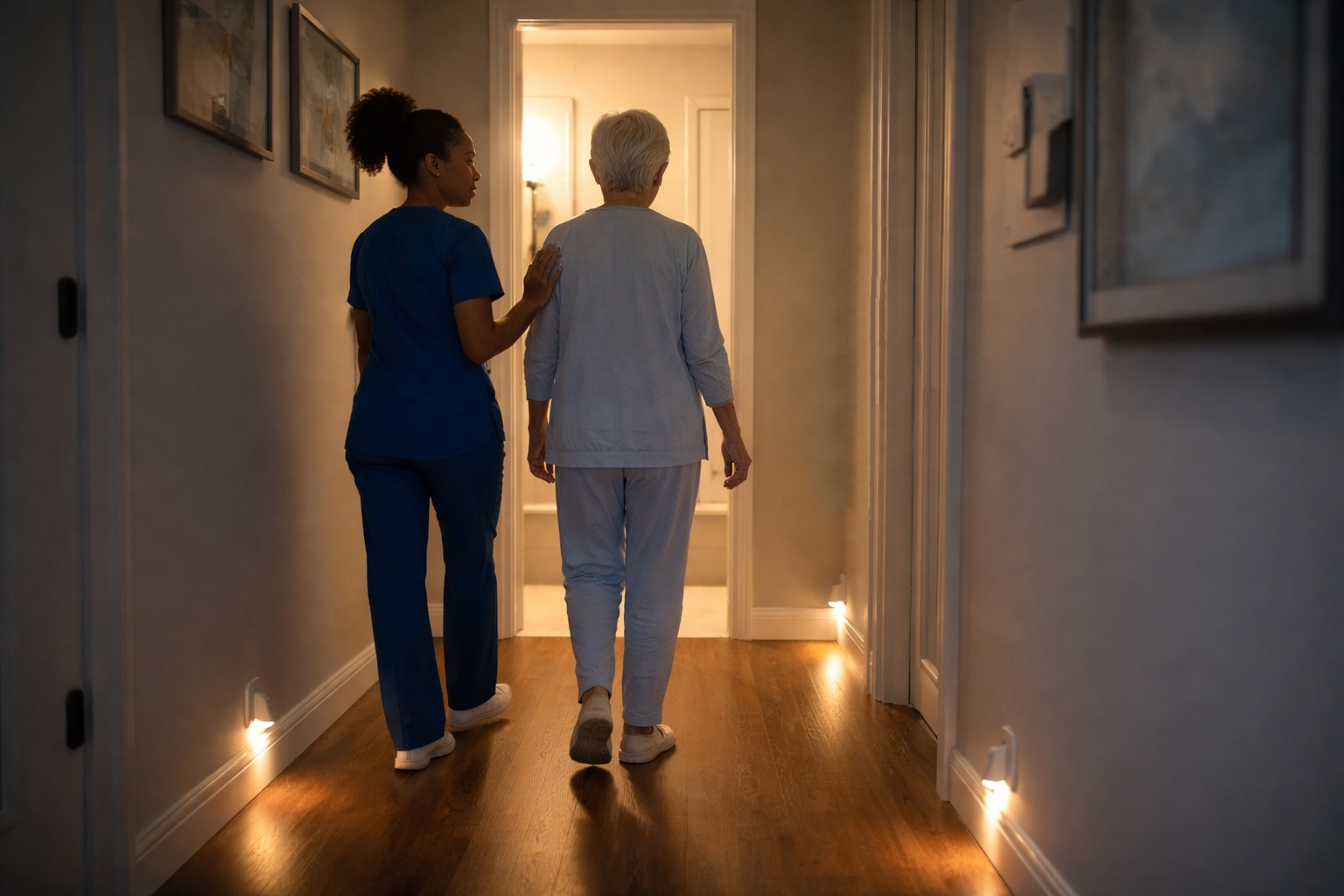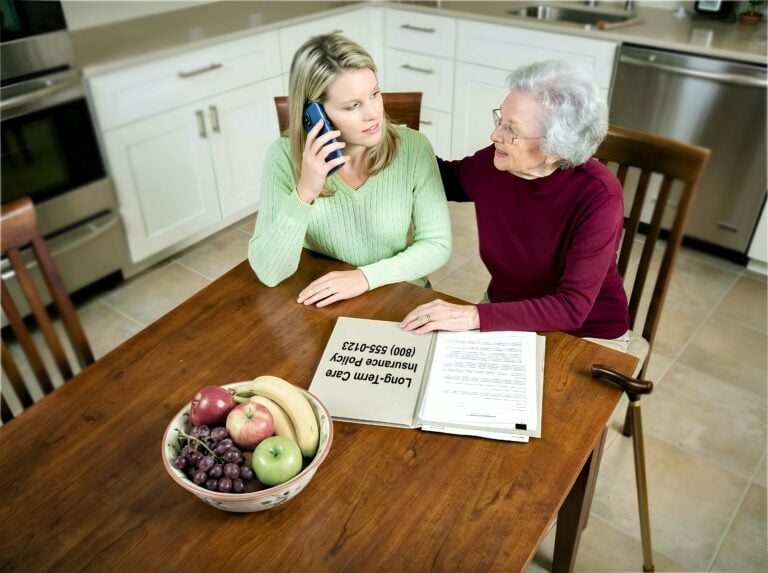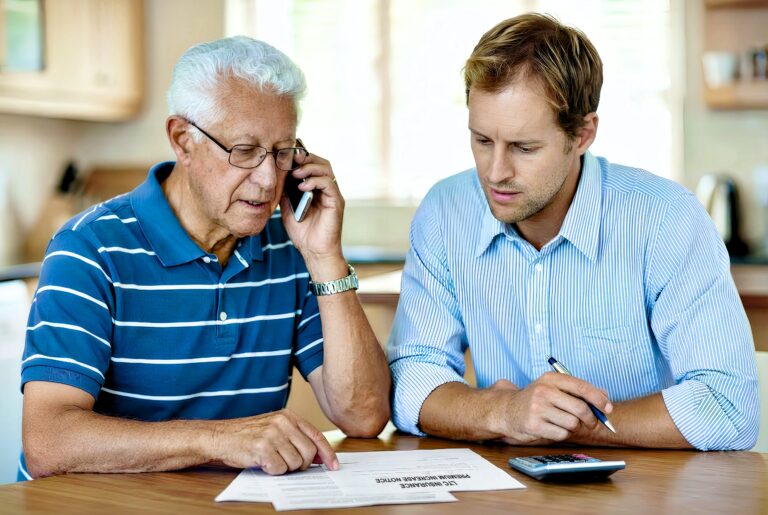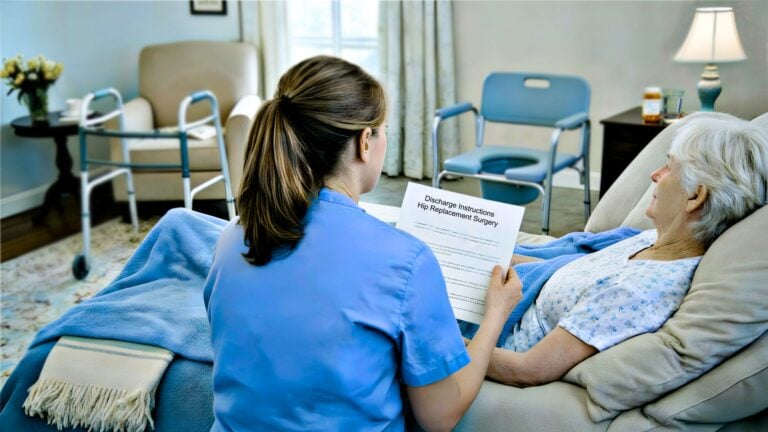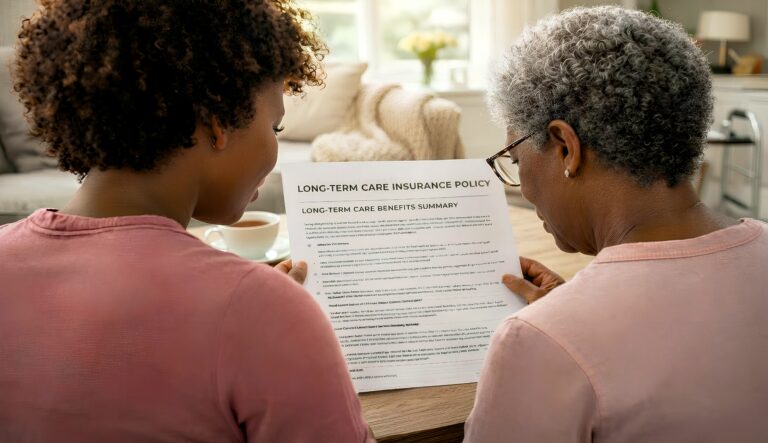Your mom calls at 3 a.m.
She was getting up to use the bathroom, caught her foot on the rug, and went down hard. She’s been lying on the cold floor for two hours because she couldn’t reach the phone.
The X-ray shows a broken hip. Surgery tomorrow. Rehab for months. And the doctor says what no one wants to hear:
“Many patients her age never fully recover from this.”
This scene plays out 800,000+ times per year in America.
And here’s what makes it tragic: Most falls are entirely preventable.
Not with expensive equipment. Not with medication. With simple changes that take an afternoon to implement.
Yet most families do nothing — until after the first fall.
This article provides a comprehensive, evidence-based guide to preventing falls in seniors — covering the latest research on what actually works, the hidden risk factors most people miss, and the specific interventions that reduce fall risk by 30-50%.
Because the modifications you make this week could prevent the crisis that changes everything.
The Devastating Reality of Falls (Updated 2025-2026 Statistics)
How Common Are Falls?
The numbers are staggering — and getting worse:
- 1 in 4 adults over 65 falls each year (28.7% according to the latest CDC data)
- Every 11 seconds, an older adult is treated in an emergency room for a fall
- Every 19 minutes, an older adult dies from a fall
- 36 million falls occur among older adults annually
- 3 million+ emergency department visits for fall injuries each year
- Over 800,000 hospitalizations annually from falls (primarily hip fractures and head injuries)
- 38,000+ deaths from falls annually — a number that has increased 41% over the past decade
And most falls go unreported:
- Less than half of seniors who fall tell their doctor
- By the time medical professionals know, the pattern is often established
Why Falls Are So Dangerous for Seniors
Falls aren’t just painful inconveniences. They’re often life-altering — or life-ending.
Physical consequences:
Hip fractures:
- 95% of hip fractures are caused by falls (usually falling sideways)
- 300,000+ hip fractures per year in adults over 65
- 20-30% of hip fracture patients die within one year
- 40% never regain pre-fall independence
- 25% require long-term nursing home care
Traumatic brain injuries (TBI):
- Falls are the #1 cause of TBI in older adults
- TBI from falls accounts for over 80% of TBI-related hospitalizations in seniors
- Even “mild” head injuries can cause lasting cognitive problems
- Blood thinners (common in seniors) make head injuries far more dangerous
Other injuries:
- Wrist fractures (from trying to catch themselves)
- Spinal fractures
- Shoulder injuries
- Severe bruising and soft tissue damage
The Psychological Devastation: Fear of Falling
What happens AFTER a fall may be as damaging as the fall itself:
- 40-70% of fall survivors develop a fear of falling
- Fear leads to activity restriction (“I’ll just stay in my chair”)
- Activity restriction causes muscle weakness and deconditioning
- Weakness increases fall risk → More falls → More fear
This creates a devastating downward spiral: Fall → Fear → Inactivity → Weakness → More falls → Loss of independence → Depression → Decline
NEW Research (2024): Fear of falling predicts future falls more strongly than prior falls. Seniors with high fear but no history of falls have 2x the fall risk of those with low fear.
The Financial Cost
Falls are costly:
- $50+ billion annually in medical costs (up from $34 billion in 2020)
- Average hip fracture costs $40,000-60,000 (surgery + rehab)
- Average fall-related ER visit: $10,000-15,000
- Hospital stays account for 65% of fall-related costs
- Non-fatal fall injuries cost $29,000 per patient on average
By 2030, fall-related costs are projected to exceed $100 billion annually as the population ages.
Why Do Seniors Fall? (The Risk Factors)
Falls aren’t random accidents. They result from identifiable, often modifiable risk factors.
Intrinsic Risk Factors (Physical/Medical)
1. Lower Body Weakness
The single most significant predictor of falls.
- Leg muscle strength decreases 10-15% per decade after age 50
- Weak legs can’t recover from stumbles
- Weak core muscles impair balance
NEW Finding (2024): Sarcopenia (age-related muscle loss) affects 30% of adults over 60 and 50% over 80 — and dramatically increases fall risk.
2. Balance and Gait Problems
How we walk and balance deteriorates with age:
- Vestibular system (inner ear balance) declines
- Proprioception (knowing where your body is in space) weakens
- Reaction time slows
- Gait changes: shuffling, shorter steps, wider stance
Warning signs:
- Holding onto furniture while walking
- Difficulty standing on one foot
- Needing to look at feet while walking
- Difficulty turning quickly
3. Vision Problems
80% of balance information comes from vision.
- Cataracts blur vision and reduce contrast sensitivity
- Glaucoma causes peripheral vision loss
- Macular degeneration affects central vision
- Bifocals/progressives distort depth perception (especially on stairs)
NEW Research (2024): Updating eyeglass prescriptions reduces falls by 20-40% — yet 25% of seniors haven’t had an eye exam in 2+ years.
4. Chronic Conditions
Diseases that increase fall risk:
- Parkinson’s disease (balance, freezing gait) — 60% fall annually
- Stroke (weakness, balance, coordination)
- Diabetes (neuropathy, vision, medication effects)
- Arthritis (pain, limited mobility)
- Heart disease (dizziness, blood pressure drops)
- Dementia (judgment, awareness, gait changes)
- Orthostatic hypotension (blood pressure drops when standing)
5. Medications
Medications are a MAJOR — and often overlooked — fall risk.
High-risk medication categories:
| Medication Type | Why It Increases Fall Risk |
|---|---|
| Sedatives/sleep aids (Ambien, Lunesta) | Drowsiness, impaired balance, and confusion |
| Benzodiazepines (Xanax, Valium, Ativan) | Sedation, impaired coordination |
| Antidepressants (especially older tricyclics) | Dizziness, low blood pressure |
| Antipsychotics | Sedation, movement problems |
| Blood pressure medications | Orthostatic hypotension (dizziness when standing) |
| Opioid pain medications | Sedation, impaired balance |
| Antihistamines (Benadryl) | Sedation, confusion (especially in the elderly) |
| Muscle relaxants | Sedation, weakness |
Polypharmacy (5+ medications) doubles fall risk — and the average senior takes 5-7 medications.
NEW Research (2025): “Deprescribing” (safely reducing unnecessary medications) reduces falls by 24% — yet only 5% of seniors receive medication review specifically for fall risk.
6. Vitamin D Deficiency
70-80% of older adults have insufficient vitamin D.
Why it matters for falls:
- Vitamin D is essential for muscle function
- Deficiency causes muscle weakness and pain
- Affects balance and coordination
- Increases fracture severity if a fall occurs
NEW Guidelines (2024): 800-1,000 IU of vitamin D daily reduces falls by 20% in individuals with vitamin D deficiency.
7. Foot Problems and Footwear
Feet are the foundation — problems there affect everything above:
- Bunions, hammertoes, and corns affect balance
- Neuropathy (can’t feel the floor) impairs feedback
- Weakness in the foot muscles
Dangerous footwear:
- Slippers without backs
- High heels (any height)
- Worn-out shoes with no grip
- Walking barefoot or in socks
- Shoes that are too loose or too tight
Extrinsic Risk Factors (Environmental)
60% of falls occur in the home — the place that should be safest.
The Most Dangerous Hazards:
Bathroom (80% of in-home falls):
- Wet, slippery surfaces
- Hard surfaces to fall on
- Stepping over the tub ledge
- No grab bars
- Poor lighting
Stairs:
- Missing or inadequate handrails
- Worn carpet
- Poor lighting
- Clutter on the steps
Living areas:
- Throw rugs (trip hazard)
- Electrical cords across walkways
- Clutter on the floor
- Low furniture (ottomans, coffee tables)
- Pets underfoot
Bedroom:
- Dark path to the bathroom at night
- The bed is too high or too low
- Clutter between the bed and the bathroom
Outdoors:
- Uneven walkways
- Poor lighting
- Slippery surfaces (ice, wet leaves)
- Steps without handrails
Evidence-Based Fall Prevention: What Actually Works
Not all fall prevention interventions are equally effective. Here’s what research shows actually reduces falls:
1. Exercise (Most Powerful Intervention)
Exercise that targets strength and balance reduces falls by 23-42%.
The most effective types:
Tai Chi (Strongest Evidence)
NEW Meta-Analysis (2024): Tai Chi reduces falls by 42% — the most effective single intervention.
Why it works:
- Improves balance and proprioception
- Strengthens legs (primarily through slow, controlled movements)
- Improves reaction time
- Reduces fear of falling
- Provides social engagement
Dose: 2-3 sessions per week for 12+ weeks
Otago Exercise Program (Strong Evidence)
A specific home-based program developed in New Zealand:
- Strength and balance exercises
- Walking program
- Individualized by a physical therapist
- Reduces falls by 35%
- Especially effective for frail seniors
Components:
- Leg strengthening (calf raises, knee bends, hip strengthening)
- Balance exercises (tandem walking, single-leg stance)
- Walking 30 minutes 3x/week
General Strength and Balance Training
Any program that includes these elements helps:
- Lower body strength exercises
- Balance challenges (standing on one foot, walking heel-to-toe)
- Core strengthening
- Flexibility/stretching
What DOESN’T help:
- Walking alone (doesn’t challenge balance enough)
- Upper body exercise alone
- Very gentle exercise (must be challenging)
2. Home Modifications (38% Fall Reduction)
Environmental modifications — especially when combined with occupational therapy assessment — reduce falls by 38%.
Priority modifications:
| Location | Modification | Fall Reduction |
|---|---|---|
| Bathroom | Grab bars at the toilet and tub | 25-30% |
| Bathroom | Non-slip mats | 15-20% |
| Stairs | Handrails on both sides | 20-25% |
| Throughout | Remove throw rugs | 15-20% |
| Throughout | Improve lighting | 10-15% |
Most cost-effective approach: Professional occupational therapy home assessment identifies specific risks for that individual.
3. Medication Review (24% Fall Reduction)
Reviewing and optimizing medications reduces falls by 24%.
What should happen:
- Complete list of all medications (including OTC and supplements)
- Review by a pharmacist or a physician
- Identify high-risk medications
- Eliminate unnecessary medications
- Reduce doses where possible
- Change timing (e.g., blood pressure meds at bedtime instead of morning)
NEW Program (2024): “Deprescribing” protocols specifically target fall-risk medications. Ask your doctor: “Are all these medications still necessary?”
4. Vision Correction (20-40% Fall Reduction)
Annual eye exams and appropriate corrective lenses significantly reduce the risk of falls.
Key interventions:
- Update eyeglass prescription
- Cataract surgery (if indicated)
- Single-vision glasses for walking (not bifocals)
- Adequate lighting throughout the home
NEW Finding (2024): Cataract surgery reduces fall risk by 34% — yet 50% of seniors with cataracts don’t get surgery.
5. Vitamin D Supplementation (20% Fall Reduction)
For those with a deficiency, vitamin D supplementation reduces the risk of falls by 20%.
Recommended:
- 800-1,000 IU daily for fall prevention
- Higher doses may be needed to correct a severe deficiency
- Best absorbed with food containing fat
- Consider a combination with calcium for bone health
Get tested: A simple blood test (25-hydroxyvitamin D) identifies deficiency.
6. Foot Care and Footwear (Reduction Varies)
Proper footwear and foot care:
- Podiatrist evaluation for foot problems
- Well-fitting shoes with non-slip soles
- Low heel (under 1 inch)
- Firm heel support
- Avoid walking barefoot or in socks
Best footwear characteristics:
- Thin, firm sole (better floor feedback)
- Non-slip rubber sole
- Supportive heel
- Secure fit (no slipping)
7. Assistive Devices (When Indicated)
When balance is impaired, assistive devices help:
- Canes — For mild balance impairment
- Walkers — For moderate impairment
- Rollators — A walker with wheels and a seat for those who fatigue
- Grab bars — Throughout the home
Critical: Devices must be fitted appropriately, and the patient must be trained to use them. Improper use can INCREASE fall risk.
8. Medical Alert Systems
Don’t prevent falls but dramatically improve outcomes:
- Quick response if a fall occurs
- Automatic fall detection (many newer systems)
- Reduces time lying on the floor (which causes complications)
- Provides peace of mind (reduces fear of falling)
NEW Technology (2025):
- Automatic fall detection (Apple Watch, dedicated medical alert devices)
- Radar-based room sensors that detect falls without wearables (Vayyar, Nobi)
- AI-powered analysis that predicts fall risk from gait patterns
The Multi-Factorial Approach (Most Effective)
NEW Research (2024-2025): Combining multiple interventions is far more effective than any single intervention.
The “STEADI” Framework (CDC Recommended):
S – Screen for fall risk
T – Target modifiable risk factors
E – Educate patients and caregivers
A – Assess gait, strength, and balance
D – Design individualized interventions
I – Implement and follow up
Multi-component programs reduce falls by 50%+ when they include:
- Exercise (strength and balance)
- Home modifications
- Medication review
- Vision correction
- Vitamin D
- Education
Fall Risk Assessment: How to Know If Your Parent Is at Risk
Quick Screening Questions
Ask your parent:
- Have you fallen in the past year?
- Do you feel unsteady when standing or walking?
- Do you worry about falling?
If YES to any of these → Comprehensive assessment needed
Simple Tests You Can Do at Home
Timed Up and Go (TUG) Test
What it measures: Mobility and balance
How to do it:
- A person sits in a chair with armrests
- On “go,” they stand up (using arms if needed)
- Walk 10 feet (3 meters)
- Turn around
- Walk back and sit down
- How long does it take?
Results:
- Under 12 seconds: Normal, low fall risk
- 12-20 seconds: Moderate fall risk
- Over 20 seconds: High fall risk — needs intervention
Single Leg Stand Test
What it measures: Balance
How to do it:
- Stand near the wall or counter (for safety if needed)
- Stand on one foot
- How long can they maintain balance
- Repeat on the other leg
Results:
- Under 5 seconds: High fall risk
- 5-10 seconds: Moderate risk
- Over 10 seconds: Lower risk
4-Stage Balance Test
Progressively harder balance positions:
- Feet side by side — Hold 10 seconds
- Semi-tandem (heel of one foot beside the big toe of the other) — Hold 10 seconds
- Tandem (heel directly in front of toes) — Hold 10 seconds
- Single leg stand — Hold 10 seconds
If they can’t hold position 3 for 10 seconds → High fall risk
Professional Assessment
For comprehensive evaluation, see:
- Primary care physician — Overall health, medications, conditions
- Physical therapist — Strength, balance, gait analysis, exercise prescription
- Occupational therapist — Home safety assessment, adaptive equipment
- Ophthalmologist/optometrist — Vision evaluation
- Podiatrist — Foot problems, footwear
- Pharmacist — Medication review for fall-risk drugs
Comprehensive Fall Prevention Plan
Step 1: Assess Risk (Week 1)
☐ Complete screening questions
☐ Do the Timed Up and Go test
☐ Do balance tests
☐ Walk through the home identifying hazards
☐ List all medications
☐ Schedule a doctor appointment for fall risk assessment
Step 2: Address Medical Factors (Weeks 2-4)
☐ Medication review with doctor or pharmacist
- Identify high-risk medications
- Eliminate unnecessary ones
- Adjust doses or timing
☐ Vision check
- Update eyeglass prescription
- Consider cataract surgery if indicated
- Get single-vision glasses for walking
☐ Vitamin D test and supplementation
- Blood test for 25-hydroxyvitamin D
- Supplement 800-1,000 IU daily if deficient
☐ Check blood pressure lying, sitting, and standing
- Identify orthostatic hypotension
- Adjust medications if needed
☐ Address underlying conditions
- Manage diabetes, Parkinson’s, arthritis, etc.
- Treat foot problems
Step 3: Home Safety Modifications (Weeks 2-4)
Bathroom (Priority #1):
☐ Install grab bars at the toilet
☐ Install grab bars in the shower/tub
☐ Add a non-slip mat in the tub/shower
☐ Add a non-slip mat on the bathroom floor
☐ Install nightlight
☐ Add shower chair if needed
☐ Add a handheld showerhead
☐ Consider a raised toilet seat
Stairs:
☐ Install handrails on both sides
☐ Add non-slip treads
☐ Ensure adequate lighting
☐ Install light switches top and bottom
☐ Remove clutter from stairs
☐ Secure carpet
Throughout Home:
☐ Remove or secure all throw rugs
☐ Remove clutter from floors
☐ Secure electrical cords along walls
☐ Improve lighting in all areas
☐ Add nightlights in hallways and bathrooms
☐ Clear pathways (36+ inches wide)
☐ Remove low furniture from walking paths
☐ Arrange furniture for easy navigation
Bedroom:
☐ Ensure the bed is the proper height
☐ Add motion-activated nightlight
☐ Clear path to bathroom
☐ Place phone within reach
☐ Keep non-slip footwear by the bed
Exterior:
☐ Repair uneven walkways
☐ Add handrails to outdoor steps
☐ Install motion-activated lighting
☐ Keep walkways clear of debris
Step 4: Start Exercise Program (Week 3 and Ongoing)
Option 1: Tai Chi Class
- Find a local class for seniors
- 2-3 times per week
- Most effective single intervention (42% fall reduction)
Option 2: Physical Therapy
- Get a referral from a doctor
- PT designs an individualized program
- Teaches Otago or similar exercises
- Medicare covers with a referral
Option 3: Home Exercise Program
- Balance exercises daily
- Strength exercises 2-3x/week
- Walking 30 minutes most days
Sample Home Exercise Routine:
Balance exercises (daily, 10-15 minutes):
- Single leg stands (hold counter, progress to hands-free)
- Heel-to-toe walking
- Standing on a foam pad
- Weight shifts side to side
Strength exercises (every other day, 15-20 minutes):
- Sit to stand (from chair, no hands)
- Calf raises
- Step-ups on the bottom stair
- Hip strengthening (side leg raises)
- Knee strengthening (mini squats)
Step 5: Address Footwear and Foot Care (Week 4)
☐ Evaluate current footwear
☐ Purchase proper shoes (non-slip, supportive, low heel)
☐ Dispose of unsafe slippers
☐ See a podiatrist if foot problems exist
☐ Never walk barefoot or in socks
Step 6: Emergency Preparedness (Week 4)
☐ Medical alert system — especially if living alone
- Consider the automatic fall detection feature
- Ensure it’s worn consistently (even in the bathroom)
☐ Emergency contacts posted by every phone
☐ Phone accessible in every central room
☐ Teach how to get up after a fall
- Roll to the side
- Get on hands and knees
- Crawl to sturdy furniture
- Use furniture to stand
☐ Practice calling for help
Step 7: Ongoing Monitoring (Continuous)
☐ Reassess fall risk every 6 months
☐ Update the medications list after every change
☐ Annual vision exams
☐ Continue exercise program permanently
☐ Modify home as needs change
☐ Watch for new hazards
How Professional Caregivers Prevent Falls
A caregiver in the home significantly reduces fall risk—even more than home modifications alone.
How All Heart Caregivers Prevent Falls:
✓ Supervision during high-risk activities
- Bathing (80% of falls occur in the bathroom)
- Walking, especially on stairs
- Transfers (bed to chair, toilet, etc.)
- Nighttime bathroom trips
✓ Mobility assistance
- Steady arm for walking
- Proper use of a walker or cane
- Safe transfer techniques
- Standing by during balance challenges
✓ Medication management
- Ensures medications are taken correctly
- Monitors for side effects (dizziness, confusion)
- Communicates concerns to family and medical providers
✓ Exercise facilitation
- Encourages daily balance exercises
- Accompanies on walks
- Assists with physical therapy exercises
- Motivates when motivation is lacking
✓ Home safety monitoring
- Notices new hazards
- Keeps pathways clear
- Reports concerns to the family
- Ensures proper lighting
✓ Fall risk reduction
- Ensures adequate footwear is worn
- Helps with foot care
- Monitors hydration (dehydration causes dizziness)
- Encourages getting up slowly (prevents blood pressure drops)
✓ Quick response if a fall occurs
- Trained in proper response (don’t move if injury suspected)
- Immediate notification of family
- Communication with medical providers
- Documentation for the medical team
✓ Reduction of fear of falling
- Confidence that help is available
- Encouragement to stay active (not restrict activities)
- Support during challenging activities
- Reassurance and emotional support
The Research: Caregivers Reduce Falls
NEW Studies (2024):
- Supervised exercise programs reduce falls 50% more than unsupervised programs
- 24-hour supervision reduces fall-related injuries by 60%
- Consistent caregiver presence reduces fear of falling by 40%, which itself reduces falls
Special Considerations
Fall Prevention for Dementia Patients
People with dementia have 2-3x higher fall risk:
Why:
- Impaired judgment and awareness
- Gait and balance changes
- Medications (often sedating)
- Inability to recognize hazards
- Forgetting to use assistive devices
Additional strategies:
- Constant supervision during high-risk activities
- Bed and chair alarms
- Door alarms (prevent wandering)
- Simplified environment (less clutter)
- Visual cues (contrasting colors for edges)
- Avoid reasoning (“you need to use your walker”) — use gentle guidance instead
- Consider falls as a possible sign of UTI or other infection (common trigger)
After a Fall: What to Do
Immediate response:
- Don’t panic — Stay calm
- Don’t move immediately — Assess for injuries first
- Check for pain — Head, hip, back, wrists
- If no severe pain — Roll to side, get to hands and knees, crawl to furniture, use furniture to stand
- If severe pain or can’t move — Call for help (medical alert, phone, yell)
- If a head injury is possible — Call 911, don’t move
- Apply ice to injuries
- Report to doctor — Even if “fine” (pattern needs to be documented)
After the fall:
☐ Complete incident report (what happened, where, when, injuries)
☐ Notify doctor within 24 hours
☐ Watch for signs of delayed injury (confusion, pain, swelling)
☐ Identify the cause and implement the prevention
☐ Consider a physical therapy evaluation
☐ Reassess home safety
☐ Consider increased supervision
Fall Prevention Technology (2025-2026)
Wearable Fall Detection
Apple Watch Series 9/10 and Ultra:
- Automatic fall detection
- Calls 911 if no response
- GPS location
- Also monitors heart rhythm, detects AFib
Medical alert devices with fall detection:
- Medical Guardian, Bay Alarm Medical, Lifeline
- 24/7 monitoring center
- Automatic fall alerts
- GPS tracking (mobile devices)
Non-Wearable Fall Detection (NEW)
Radar-based sensors:
- Vayyar Care — Wall-mounted sensor detects falls without cameras
- Nobi — Smart ceiling light with fall detection
- TruSense — Motion and fall detection system
Benefits:
- No device to wear or charge
- Works in the bathroom (where most falls occur)
- No privacy concerns (no cameras)
- Detects falls automatically
Gait Analysis and Prediction
NEW Technology (2025):
- AI-powered systems analyze walking patterns
- Detect increased fall risk BEFORE a fall occurs
- Alert caregivers to intervene
- Guide targeted interventions
Systems:
- Quantitative gait analysis at PT clinics
- Bright flooring that detects gait changes
- Wearable sensors that track movement patterns
Smart Home Integration
Voice control (Alexa, Google Home):
- “Turn on lights” — No fumbling for switches
- “Call [family member]” — Hands-free emergency contact
- Medication reminders
- Appointment reminders
Motion-activated lighting:
- Hallways, bathroom, bedroom
- Turns on automatically when walking
- Prevents fumbling in the dark
Smart sensors:
- Motion sensors detect unusual patterns
- Door sensors track coming/going
- Bed sensors detect when a person gets up but doesn’t return
The Bottom Line: Falls Are Preventable
Key takeaways:
✓ 1 in 4 seniors fall each year — but most falls are preventable
✓ Falls have devastating consequences — hip fractures, TBI, loss of independence, death
✓ The multi-component approach is most effective (50%+ reduction):
- Exercise (especially Tai Chi) — 42% reduction
- Home modifications — 38% reduction
- Medication review — 24% reduction
- Vision correction — 20-40% reduction
- Vitamin D — 20% reduction
✓ Start with assessment — Identify specific risks
✓ Prioritize bathroom safety — 80% of in-home falls occur there
✓ Exercise is the most powerful intervention — Strength + balance training
✓ Review medications — Many common drugs increase fall risk
✓ Caregivers dramatically reduce falls — Supervision + assistance + exercise encouragement
✓ After one fall, risk doubles — Act immediately to prevent the next one
We Can Help
At All Heart Home Care, fall prevention is a core component of our care approach.
Our caregivers help prevent falls by:
✓ Supervising high-risk activities (bathing, walking, transfers)
✓ Providing mobility assistance
✓ Managing medications
✓ Encouraging and assisting with exercise
✓ Monitoring home safety
✓ Responding quickly if falls occur
✓ Reducing fear of falling through supportive presence
During your free in-home consultation, we’ll:
✓ Assess your loved one’s fall risk
✓ Walk through the home and identify hazards
✓ Recommend priority modifications
✓ Explain how our caregivers can reduce fall risk
✓ Create a care plan focused on safety and independence
Our rates begin at $37/hour (depending on shift length), and we provide transparent pricing with no hidden fees.
Call us at (619) 736-4677 for a free consultation.
Because preventing one fall could save your parent’s independence, quality of life — even their life.
Resources
- CDC STEADI (Fall Prevention for Professionals): cdc.gov/falls
- NCOA Falls Free Initiative: ncoa.org/healthy-aging/falls-prevention
- Eldercare Locator: 1-800-677-1116 (find local fall prevention programs)
- American Physical Therapy Association: choosept.com (find a PT)
- Tai Chi for Seniors Programs: Local senior centers, YMCAs
Fall Prevention Checklist Summary
Assessment
☐ Screening questions (falls, unsteadiness, fear)
☐ Timed Up and Go test
☐ Balance tests
☐ Home hazard walk-through
☐ Medication list review
Medical Interventions
☐ Doctor’s fall risk assessment
☐ Medication review and optimization
☐ Vision exam and correction
☐ Vitamin D test and supplementation
☐ Blood pressure check (lying/sitting/standing)
☐ Foot evaluation
Home Modifications
☐ Bathroom grab bars
☐ Non-slip mats
☐ Stair handrails (both sides)
☐ Remove throw rugs
☐ Improve lighting
☐ Add nightlights
☐ Clear pathways
☐ Secure cords
Exercise Program
☐ Tai Chi class OR
☐ Physical therapy program OR
☐ Home balance/strength exercises
☐ Daily balance practice
☐ Walking 30 minutes most days
Footwear
☐ Non-slip, supportive shoes
☐ Low heel
☐ Secure fit
☐ No barefoot/sock walking
Emergency Preparedness
☐ Medical alert system (worn consistently)
☐ Phones accessible
☐ Emergency contacts posted
☐ Know how to get up after a fall
Ongoing
☐ Reassess every 6 months
☐ Continue exercise permanently
☐ Annual vision exams
☐ Report all falls to the doctor

